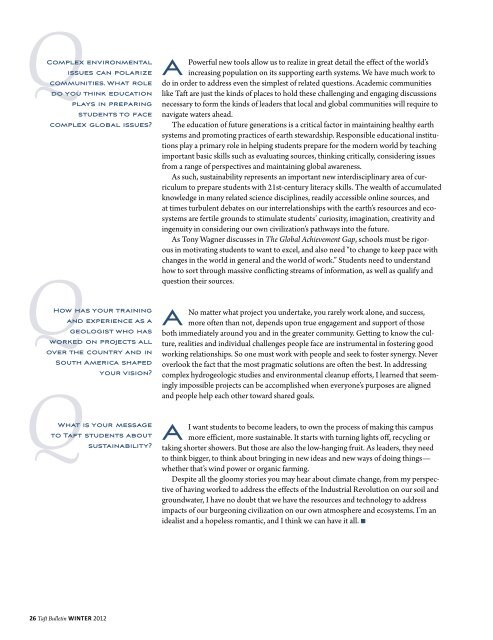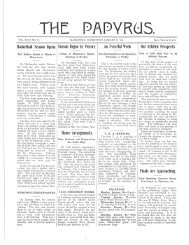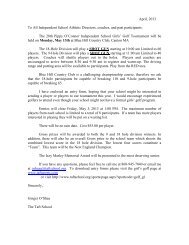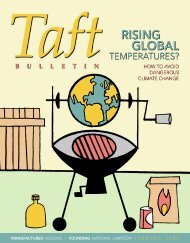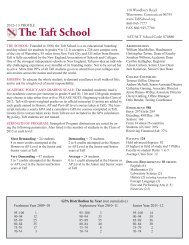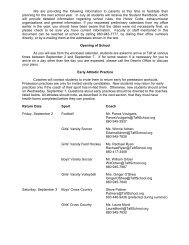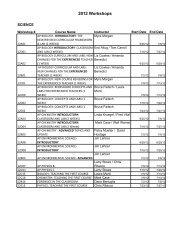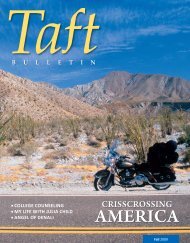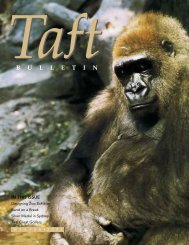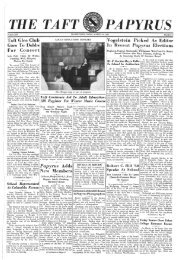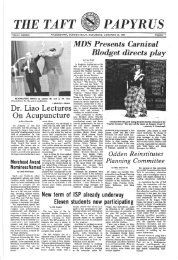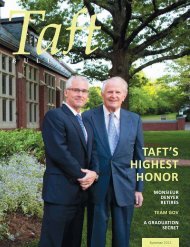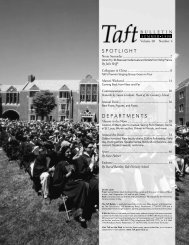Download - The Taft School
Download - The Taft School
Download - The Taft School
You also want an ePaper? Increase the reach of your titles
YUMPU automatically turns print PDFs into web optimized ePapers that Google loves.
Complex environmental<br />
issues can polarize<br />
communities. What role<br />
do you think education<br />
plays in preparing<br />
students to face<br />
complex global issues?<br />
How has your training<br />
and experience as a<br />
geologist who has<br />
worked on projects all<br />
over the country and in<br />
South America shaped<br />
your vision?<br />
What is your message<br />
to <strong>Taft</strong> students about<br />
sustainability?<br />
A<br />
Powerful new tools allow us to realize in great detail the effect of the world’s<br />
increasing population on its supporting earth systems. We have much work to<br />
do in order to address even the simplest of related questions. Academic communities<br />
like <strong>Taft</strong> are just the kinds of places to hold these challenging and engaging discussions<br />
necessary to form the kinds of leaders that local and global communities will require to<br />
navigate waters ahead.<br />
<strong>The</strong> education of future generations is a critical factor in maintaining healthy earth<br />
systems and promoting practices of earth stewardship. Responsible educational institutions<br />
play a primary role in helping students prepare for the modern world by teaching<br />
important basic skills such as evaluating sources, thinking critically, considering issues<br />
from a range of perspectives and maintaining global awareness.<br />
As such, sustainability represents an important new interdisciplinary area of curriculum<br />
to prepare students with 21st-century literacy skills. <strong>The</strong> wealth of accumulated<br />
knowledge in many related science disciplines, readily accessible online sources, and<br />
at times turbulent debates on our interrelationships with the earth’s resources and ecosystems<br />
are fertile grounds to stimulate students’ curiosity, imagination, creativity and<br />
ingenuity in considering our own civilization’s pathways into the future.<br />
As Tony Wagner discusses in <strong>The</strong> Global Achievement Gap, schools must be rigorous<br />
in motivating students to want to excel, and also need “to change to keep pace with<br />
changes in the world in general and the world of work.” Students need to understand<br />
how to sort through massive conflicting streams of information, as well as qualify and<br />
question their sources.<br />
A<br />
No matter what project you undertake, you rarely work alone, and success,<br />
more often than not, depends upon true engagement and support of those<br />
both immediately around you and in the greater community. Getting to know the culture,<br />
realities and individual challenges people face are instrumental in fostering good<br />
working relationships. So one must work with people and seek to foster synergy. Never<br />
overlook the fact that the most pragmatic solutions are often the best. In addressing<br />
complex hydrogeologic studies and environmental cleanup efforts, I learned that seemingly<br />
impossible projects can be accomplished when everyone’s purposes are aligned<br />
and people help each other toward shared goals.<br />
A<br />
I want students to become leaders, to own the process of making this campus<br />
more efficient, more sustainable. It starts with turning lights off, recycling or<br />
taking shorter showers. But those are also the low-hanging fruit. As leaders, they need<br />
to think bigger, to think about bringing in new ideas and new ways of doing things—<br />
whether that’s wind power or organic farming.<br />
Despite all the gloomy stories you may hear about climate change, from my perspective<br />
of having worked to address the effects of the Industrial Revolution on our soil and<br />
groundwater, I have no doubt that we have the resources and technology to address<br />
impacts of our burgeoning civilization on our own atmosphere and ecosystems. I’m an<br />
idealist and a hopeless romantic, and I think we can have it all. j<br />
26 <strong>Taft</strong> Bulletin Winter 2012


